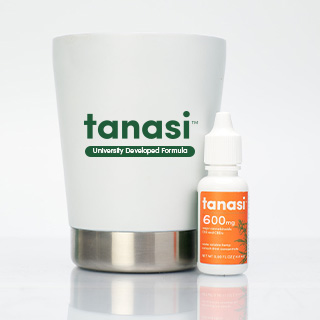CBD Effects on the Thyroid

Posted on August 18th, 2020
CBD has undoubtedly taken the mainstream market by storm – it is no longer a surprise entrant but a likely long-stay. It’s a naturally occurring cannabinoid derived from cannabis, usually the industrial hemp plant variety. Unlike THC, another common cannabinoid present in the cannabis plant, CBD is a non-psychoactive compound that does not result in a ‘high‘ feeling. Thanks to the potential benefits and non-psychoactive properties of CBD, its products may be able to help symptoms of various conditions. But what about the effects of CBD on the thyroid? Let’s take a deeper look into the thyroid and CBD.
What Is the Thyroid?
The thyroid refers to the butterfly-shaped endocrine gland located on the front part of the neck and below the Adam’s apple. The thyroid secretes thyroid hormones, with the main one being thyroxine (also known as T4). Thyroid hormones serve several functions in the body, including influencing metabolism, body temperature, and growth and development. In infants, adequate levels of thyroid hormone are essential for brain development.
Various thyroid conditions interfere with the normal functioning of the thyroid, and for which CBD may be able to help with the symptoms. These conditions include thyroiditis, goiter, hypothyroidism, hyperthyroidism, Graves disease, thyroid nodule, thyroid cancer, and thyroid storm.
Cannabinoids and the Endocrine System
The endocrine system refers to a collection of glands responsible for producing hormones that regulate various bodily functions. Some of these functions include metabolism, reproduction, growth and development, and tissue function. The thyroid gland is one of the glands that make up the endocrine system.
Our bodies contain an endocannabinoid system, made up of endocannabinoids, receptors, and enzymes. It’s responsible for balance and homeostasis in the body. Endocannabinoids bind to specific receptors for various functions, including thyroid function. Enzymes are tasked with breaking down the endocannabinoids soon after completing their function.
Early research indicates that consuming cannabis may affect the endocrine system. Particularly, the CB1 cannabinoid receptor seems to have an effect on endocrine system regulation, including the thyroid hormone.
Cannabinoids like CBD interact with the endocannabinoid system in ways that may maintain balance in the human body. While studies are not conclusive on how CBD works with the endocannabinoid system, some suggest that it may help ease inflammation, reduce symptoms of anxiety and depression, and suppress seizures.
 CBD and Thyroid Conditions
CBD and Thyroid Conditions
Though there has not been much research on CBD’s effect on the thyroid, early studies suggest cannabinoid receptors (CB1 and CB2 receptors) on malignant and benign thyroid lesions could serve as therapeutic targets to inhibit some thyroid conditions.
The studies also suggest that both receptors interfere with molecular interactions and influence the formation and growth of thyroid tumors. As indicated earlier, this could help inhibit thyroid tumor progression.
Scientists also discovered that there are cannabinoid receptors in thyroid gland cells and the hypothalamic paraventricular nucleus (PVN). The PVN is a part of the brain that sends signals to the pituitary gland, releasing hormones to organs like the thyroid and adrenal gland to regulate their activities
Can CBD Work for People Managing Thyroid Conditions?
Besides its potential to impact the growth of thyroid tumors, the effects of CBD may impact thyroid conditions such as hyperthyroidism and hypothyroidism. And, it may help with the symptoms that come with these conditions. Cannabinoids seem to affect cannabinoid receptors in the thyroid gland. This suggests that CBD may affect thyroid activities (secretion of thyroid hormones).
Hyperthyroidism refers to when the thyroid gland goes into overdrive. (Producing too much T4.)This results in an increased metabolic rate and a rapid heartbeat. While there’s no proof that CBD can help normalize this condition, the ability of cannabinoids to influence cannabinoid receptor activity in the thyroid suggests that CBD has the potential to impact these conditions.
Other studies indicate that CBD and other cannabinoids may help manage thyroid disorders symptoms, including:
- Pain
- Inflammation
- Dry skin
- Anxiety and depression
- Loss of appetite
- Insomnia
CBD offers anti-inflammatory and antidepressant potential and may, therefore, help ease the inflammation and pain associated with thyroid conditions. It may also help sleep disorders like insomnia. Thyroid conditions such as hyperthyroidism are also characterized by weight loss due to diarrhea, which may be managed by CBD.
CBD Products for Thyroid Conditions
For now, we have no scientific proof that CBD can manage thyroid conditions. However, this cannabinoid may help manage the associated symptoms.
Studies only indicate the effect that cannabinoids have on the endocannabinoid and endocrine systems. However, CBD has properties that may help manage some thyroid condition symptoms.
CBD oil is probably the most common CBD product among individuals who believe in the potential of this cannabinoid. But why CBD oil? Oils are great molecular carriers.
You can easily ingest CBD oil and efficiently absorb it into the bloodstream. Besides being taken sublingually, CBD oil can also be used by adding in smoothies and shakes. Determining the right dosing of your CBD oil is likely to be a trial and error process before you find what works for you. Be sure to check the instructions and recommended dosing on the product, as this may vary between products and companies.
When choosing your CBD oil, it is important that you choose full-spectrum CBD oil as it contains most of the cannabinoids present in the cannabis or hemp plant as well as other essential compounds like terpenes. It is also advisable to go for a high-quality CBD oil to get the best results.
 CBD and Thyroid Medication
CBD and Thyroid Medication
Like many other medications, CBD and thyroid medications compete in the cytochrome P450 pathways for metabolism. Such interaction could result in the accumulation of thyroxine due to the competition, and may, in turn, lead to hyperthyroidism. Whenever thyroid medication and CBD oil are taken too closely together, individuals may experience anxiety and mild nausea.
Apart from the interaction of CBD oil and thyroid medication, using CBD oil is legal and usually safe. Most states allow CBD use, as long as the THC content is not greater than 0.3%. However, it’s always a good idea to check with state and local laws first.
If you are unsure whether there could be a risk of interaction between your thyroid medication and CBD oil, lookout for a “grapefruit warning”. This would give you an idea of whether an interaction is likely. Grapefruit contains compounds known as furanocoumarins that bind with CYP450 enzymes and neutralize them, making the breakdown and elimination of drugs from the body difficult.
Always check your medicine label and always consult your doctor before taking CBD. This is especially important if you are taking any medication or have any health conditions.
Does Marijuana Affect the Thyroid?
Now that you are aware of CBD’s potential effects on the thyroid, you may be wondering what effect marijuana could have on the thyroid. While marijuana could contain traces of CBD, it largely consists of THC, another cannabinoid present in the cannabis plant.
THC could have a similar effect on the thyroid as other cannabinoids like CBD. However, marijuana is not used to manage any thyroid conditions because of its psychoactive properties. On the other hand, CBD is non-psychoactive and doesn’t cause the ‘high’ associated with THC. It is for this reason that CBD products are more commonly legal.
Key Takeaways
There has been little research on the effects of CBD on the thyroid. However, initial studies indicate that cannabinoids interact with the endocannabinoid system. This shows that CBD could potentially influence the functioning of the endocannabinoid system. Another way through which CBD can potentially affect the thyroid is by binding with the cannabinoid receptors present in the thyroid. This way, CBD could influence the various thyroid functions, including homeostasis.
While there may be little known about the effects of CBD on the thyroid, CBD products may be used to help manage some of the symptoms associated with thyroid conditions. Conditions like hyperthyroidism and hypothyroidism are characterized by inflammation, pain, anxiety, and insomnia. Particularly, CBD has potential anti-inflammatory and antidepressant properties. These properties may help reduce symptoms such as inflammation, pain, and anxiety that come with thyroid conditions.

 CBD and Thyroid Conditions
CBD and Thyroid Conditions  CBD and Thyroid Medication
CBD and Thyroid Medication



